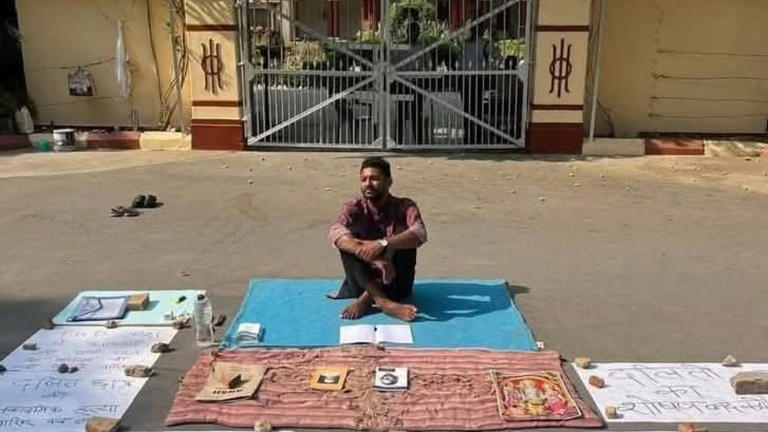Dalit Student Protests at BHU Over Denied PhD Admission, Alleges Violation of Reservation Policy
A Dalit student, Shivam Sonkar, has been staging a sit-in protest outside the Vice-Chancellor’s residence at Banaras Hindu University (BHU) in Varanasi for the past 14 days after being allegedly denied admission to the PhD programme in the Department of Peace and Conflict Studies. The protest began on March 21, a day after the PhD entrance results were announced, and continues despite assurances from the university administration.
Sonkar claims that the department had announced a total of six PhD seats. Of these, three were reserved for candidates who qualified through the Junior Research Fellowship (JRF) category, and three were meant to be filled through a Research Entrance Test (RET). He stated that he applied through the entrance test and secured the second rank. However, the three seats available through the entrance test were reportedly allocated to candidates from the General and Other Backward Class (OBC) categories, with no reservation provided for Scheduled Caste (SC) candidates like him.
Further intensifying the controversy, Sonkar pointed out that the three JRF-category seats remained unfilled. He asserted that the university had the discretion to convert these unfilled JRF seats to RET seats, thereby making room for candidates like him. However, he alleged that BHU refused to take this step, resulting in his exclusion from the programme despite his qualifying score.
On April 3, Acting Vice-Chancellor Professor Sanjay Kumar met with Sonkar and assured him that his admission request would be reconsidered. However, Sonkar remains firm in his stance and has declared that he will continue his protest until the university grants him admission into the PhD programme.
In response to the ongoing protest, the university administration issued an official statement clarifying its position. According to the statement, Shivam Sonkar had applied for admission through the RET route, which, they said, had only two available seats—one for a General category candidate and one for an OBC candidate. Both seats were filled based on merit, and since Sonkar ranked second, he could not be offered a seat. The university maintained that the remaining three seats under the JRF category were not interchangeable with RET seats. They emphasized that as per the PhD regulations, unfilled JRF seats cannot be converted into entrance test seats, and thus his demand could not be accommodated.
The situation has sparked significant attention, raising questions about the implementation of reservation policies in higher education institutions, particularly regarding flexibility in seat allocation and the handling of unfilled reserved seats. The protest has also highlighted the ongoing struggles faced by marginalized communities in accessing academic opportunities and the complexities involved in university admission processes.
For video news, visit our YouTube channel THE OLIGO.

